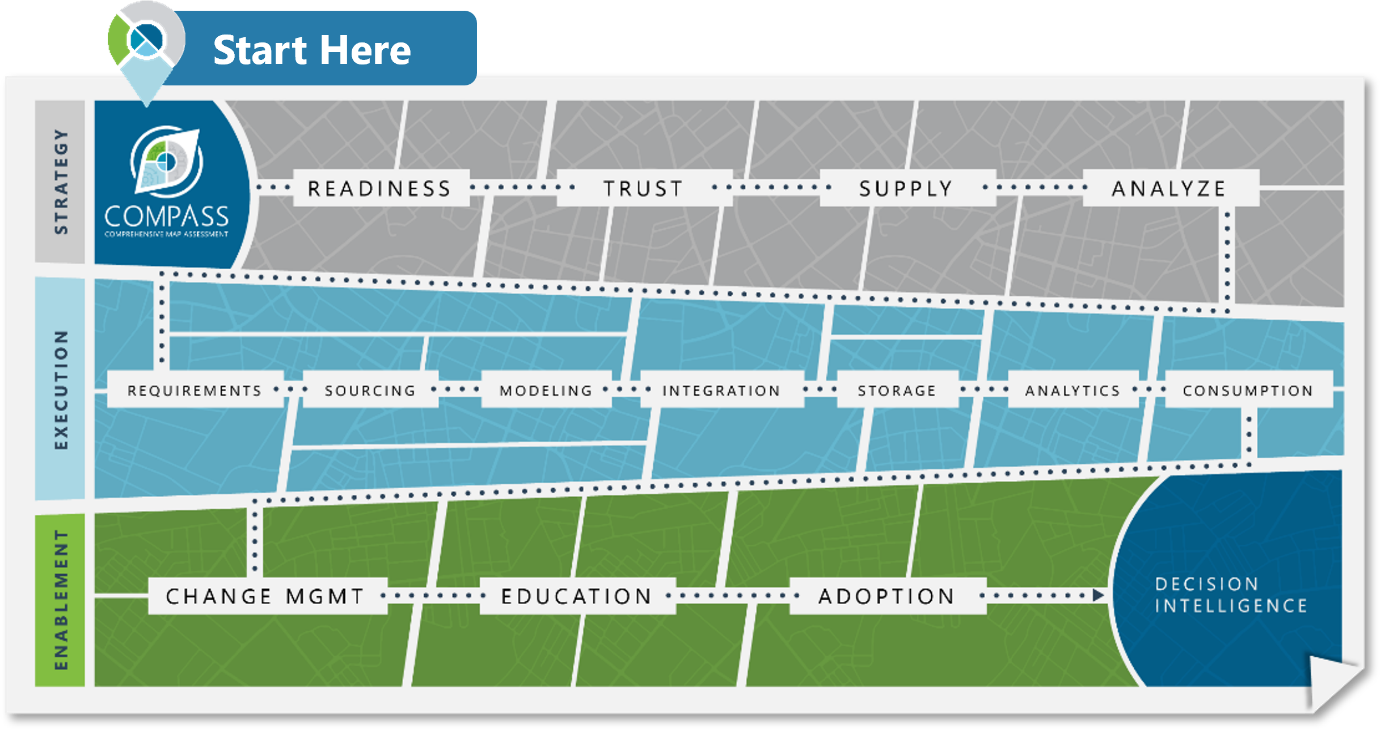It’s 2024 and AI is still all the rage. But before you embark on your AI-powered journey, it is necessary to look at your organization’s data infrastructure, sources, and systems and assess if they will support your AI ambitions. This is where a well-defined data strategy comes in. It’s the roadmap to transforming raw data into actionable insights that drive business decisions and fuel growth.
What is a Data Strategy?
A data strategy is a high-level plan that outlines how your organization will collect, manage, analyze, and leverage data to achieve specific business goals. It’s not just about the technology; it encompasses the people, processes, and governance structures needed to ensure responsible and efficient data use. It’s easy to assume that your data house is in order. But more often, they are not. From your CRM data, customer data platforms, and internal data repositories to everything else, your data systems need to be rich, resilient, and able to ‘talk to each other’ to be able to create an organization that is insight-led or AI-ready.
Why Do Companies Need a Holistic Strategy Before Their Data Journey?
In today’s data-driven world, organizations are bombarded with information from various sources. Without a guiding strategy, it’s easy to get bogged down in data collection and lose sight of the bigger picture. A holistic data strategy helps you:
- Align with Business Goals: A good strategy ensures your data efforts directly support your overall business objectives. It translates broad goals into specific data-driven initiatives.
- Optimize Data Management: It establishes clear guidelines for data collection, storage, access, and security, preventing data silos and inconsistencies.
- Empower Data-Driven Decision Making: By turning data into actionable insights, rive better outcomes.
- Embrace Data Governance: A holistic strategy includes data governance frameworks that ensure data quality, compliance with regulations, and responsible data use.
10 Things Businesses Need to Know Before Creating a Data Strategy
Building a successful data strategy requires careful consideration of various factors. Here are 10 key points to ponder before you embark on your data journey:
- Focus on Business Objectives: Data strategy is not an independent entity. It should be tightly interwoven with your organization’s overall business goals and change management strategy. Identify key performance indicators (KPIs) that align with your strategic objectives. Your data strategy should provide a roadmap for using data to improve those KPIs.
- Understand Your Data Landscape: Before diving headfirst, take stock of your existing data assets. Where is your data stored? What format is it in? How well is it documented and governed? Understanding your current data landscape will help identify gaps and areas for improvement.
- Identify Data Stakeholders: A successful data strategy requires buy-in from all levels. Identify key stakeholders across the organization – from business leaders and data analysts to IT teams and department heads. Involve them in the planning process to ensure their needs are addressed.
- Define Data Governance: Establish clear policies and procedures around data ownership, access, security, and privacy. Data governance ensures responsible data use and compliance with relevant regulations.
- Invest in Data Quality: “Garbage in, garbage out” applies heavily to data. A critical aspect of your strategy is ensuring data accuracy, consistency, and completeness. Define data quality standards and implement processes to maintain clean data.
- Choose the Right Tools: There’s a plethora of data management and analytics tools available. However, the “best” tool depends on your specific needs and budget. Evaluate your requirements and choose tools that can scale with your data growth and evolving needs.
- Embrace Data Literacy: A data-driven culture requires a data-literate workforce. Invest in training programs to equip employees across all levels with the skills to understand, interpret, and utilize data effectively.
- Embrace a Culture of Experimentation: Data analysis is a continuous process of testing, learning, and iterating. Encourage a culture of experimentation where teams can explore different data sets and analytical techniques to uncover new insights.
- Start Small and Scale Up: Don’t be afraid to start small. Identify a well-defined business problem and leverage data to find a solution. Start with small, achievable projects that demonstrate the value of data and build momentum for larger initiatives.
- Data Strategy is an Ongoing Journey: The data landscape is constantly evolving. Your data strategy should be a living document that adapts to new technologies, regulations, and business needs.
Building a data-driven organization starts with a solid data strategy. By taking a holistic approach and considering the points above, you can embark on a data journey that unlocks valuable insights and fuels your organization’s success. Remember, data is a powerful tool, but it’s only as valuable as the strategy that guides its use.
Marlabs for Data

Marlabs helps enterprises get the most out of their data. Through the recent acquisition of Data Consulting firm Onebridge, Marlabs is strategically equipped with advanced Data, Analytics, and AI capabilities that empower enterprises to solve complex business challenges with data and leverage them to activate decision intelligence.
We have over 20 frameworks that help accelerate value across each data touchpoint. From a robust ingestion strategy to data management. From Data governance to data validation, our frameworks and accelerators have helped leading organizations with a holistic strategy that is future-resilient.
Our MAP (Modern Analytics Platform) data strategy framework is developed to help enterprises fully realize the promise and power of data-driven decision intelligence. With experience, we learned that successful data initiatives require a holistic approach that encompasses people, processes, technology, and data.
MAP is a tested, proven, and customized road map designed to help you assess, plan, guide, and execute enterprise-level data strategy. It includes a series of accelerators and custom solutions that greatly shorten the time-to-value of any data-driven endeavors.
We use MAP as a guide for strategy, execution, and enablement throughout our partnerships, so you have a clear understanding of where you stand and what you need to do next.






